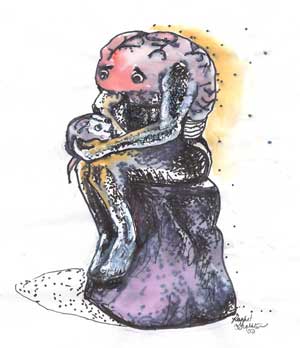Serendip is an independent site partnering with faculty at multiple colleges and universities around the world. Happy exploring!
Notes Towards Week 8 (Oct. 25): Parts II and IV with Anne --Storming the Brain: Science and Pseudoscience

Rachel Grobstein's Brain Images on Serendip
I. Kaye on coursekeeping
II. Mid-semester Assessments of what's working/needs working on:
generally, an appreciation of the diversity of topics--"the interdisciplinary nature (nurture? j/k) of this course has challenged me to expand my outlook "--along with a plea for more "foundational" texts: "I get lost in the diversity," "I'm watching still frames of a movie, but not seeing the scenes that connect one image to the next," "it's like being led down the rabbit-hole, in that you have no idea where one thing may lead you."
This is not an intro course; you are welcome to join me in the 100-level Critical Feminist Studies course, TTh 12:45-2:15 this spring (where we will be questioning the whole notion of the "foundational," discussing the act of constructing a "canon"). Spanier will also speak to this in a moment--what might "foundational" mean for a subjects as fluid and flexible as gender and sexuality? Is the search for the "foundational" one of the key tasks here?
one oft-repeated request was for a more global perspective: more non-western material, "a broader cultural perspective," "a more worldly perspective," "to learn more about gen/sex in other cultures and international issues"; particularly compelling was the observation that "the conversation about intersex bodies and identity linked to physical structures assumes a very individualistic concept of identity.…In societies where identity is more communal, do such conversations even make sense?"
generally (w/ a caveat, upcoming!) a celebration of the "comfortable, conversational atmosphere," "the creation of overlapping community spaces," the way "we all act as bouncing boards for our ideas," "the variance in perspective that comes from engaging with individuals who study in alternating areas….meeting each week…we become a part of a network."
generally (again, w/ an uncoming caveat) an appreciation that we "digitally convene" on Sundays; several of you spoke gratefully about having the challenge of on-line writing:
* I cannot "take back" what I choose to post, and that forces me to think a great deal before I post. We are responsible for our words and our actions. Posting on Serendip reinforces this idea.
* Knowing that anyone can find what I say means that I really, really have to think about it: it's something I've never really had to consider before, and I really appreciate that I have to.
a reminder that you always can amend what you say (as well as respond to what others say...)
A couple of you expressed anxieties about offending one another--"I'm not sure how to formulate my responses without potentially outraging someone"--and one of you spoke of the evaluation process itself as problematic: 'I talked to another classmate who felt it was "ballsy" that we had been asked to submit non-anonymous mid-semester evaluations. We talked about how we still are getting graded, how we still are regularly interacting with professors and classmates, and how it feels a bit risky to post negative feedback.'
in the midst of our current readings-and-discussions--
ballsy is a striking word choice (=testosterone-filled? =risk-taking?)
to say that, since there will be an evaluation @ the end (=grading),
it feels risky to some of you to do a public assessment now.
But criticism/calling one another out has to be a significant part of what we are doing;
if we have a shared investment in one another's learning/shared intellectual work,
we need to hold one another accountable for what is happening here;
criticism, for Kaye and me, is a sign of engagement, of wanting it to work better --
we're grateful for it!....
also: public posting allows you to see the diversity among us-->
to see that 1 of us, for example, really hates the on-line paper-posting-
and-responding, that another of us really dislikes the breakout sessions -->
that one size will never fit all.
III, IV. Kaye on testosterone and looking for difference....
V. Brain Storm!

1. why I like Beck ('s work -- 15 minutes):
I met her @ a Mellon 23 Workshop on Feminism
and Science, held @ Scripps, in January 2010,
and was hooked the first night when she spoke about how her new book
critiques the idea of “hardwiring”: that prenatal hormone exposures
permanently shape us for masculinity/femininity & gayness/straightness
(as she explains in the preface, she first got interested in this material
around the "science of homosexuality"/the "gay gene").
She showed us how many studies recuperate a wide variety of brain structures into a
binary framework of sex -- which is the core reason the model is both persuasive
(it reinforces what we already believe) and not useful/absolutely bankrupt.
Gay/straight brains, female/male brains, “empathizing”/systemizing” brains,
Mars. vs. Venus—> all different guises of brain organization theory:
the dominant idea of “the sexual brain” is also one that (many!?) students
are attached to: that sexual orientation is biologically dictated.
Beck calls this the “one stop shopping” theory of sex/gender/sexuality--
that a "fatal" exposure to the so-called “sex hormones” creates original and
permanent sex-typed patterns of thought, desires, and behavior. It
derives from varied studies of intersex, cognition, personality, body traits
among LGBT vs. gender-typical heterosexuals, traits of mixed-sex vs.
same-sex twins, etc, processed as though the "3-ply yarn" of sex/gender/
sexuality ("distinct, interrelated, and somewhat fuzzy around the boundaries
...a double entendre," p. 15) are “commonsense,” simple phenomena.
As socially constructed phenomena, gender and sexuality are moving targets:
see Beck's comparative definitions of
* John Money's gender identity (private experience) and gender role (public expression), vs.
* Gayle Rubin's gender (= social effect) and sex (=the remainder, the material body), vs.
* Michel Foucault's analysis of sexuality as a social product, vs.
* her own 3-ply yarn of sex (physical body), gender (psychological
attributes, social behaviors), sexuality (erotic desires and practices, pp. 13-15) and later:
* sex as the experience-independent and gender the experience-dependent part
of maleness or femaleness (p. 286).
(Evelyn Fox-Keller during the Larry Summers' debates: why do we make so
much of birth as the dividing line between what's "given" and what's learned?
Nature vs. nurture is another VERY suspicious binary!)
This is Beck's primary point: "formulating this contrast [between the relative contribution
of genetic versus environmental variables] already reveals a fundamental misunderstanding
of biology ... a growing cadre of biologists ... move firmly away from a notion of genes as static,
concrete building blocks .... the notion of genes as 'elemental particles' ... long ago
outlived its usefulness .... whatever is 'written in our genes' must be a very open-ended
story, because gene expression is a dynamic contingent process that is responsive
both to specific conditions during development and to random events ... the three key
concepts are the inseparability of experience and heredity, the importance of random
events, and the fact that development is a lifelong process (p. 271).
brain organization people believe that attraction is the core
component of sexual orientation, but consistency is never the norm;
cf. Beck's 1999 interview w/ Dr. A --
“if they’re consistent, we keep them as subjects”
-- w/ any social scientist’s understanding that
inconsistency is not noise, but the phenomenon;
she also identifies problems of gerrymandering: changing boundaries
of “homosexuality” to favor a study’s hypothesis (for instance);
the permanence of hormone effects is assumed,
rather than empiricially explored.
Gender is treated as “naturalized” in these brain organization studies,
which assume that there are only 2 genders,
that gender is invariant/permanent,
that genitals are essential sign of gender,
that everyone must be classified (no exceptions),
and that being male or female is natural,
not dependent on human decision/action.
There's much to like in Beck's book; its discussion of
* Carole Vance's classroom exercise: explain sexuality to a Martian!
(reproduction? touching genitals? becoming aroused?)
* Nelly Oudshoorn's claim that "sex hormones were invented" when
endocrinologists classified steroids (estradiaol, testosterone, progesterone)
in a dualistic system of sex, blocking other kinds of information (pp. 15-16)
* Suzanne Kessler's analysis of how docs use g&s to determine--and re-
shape -- the male/female status of bodily structures (urinate standing up,
vs. vaginal penetrability, p. 17);
but my favorite part is when Beck makes her "odd shift to plants in a
book about people," in order to demonstrate her key idea of interaction
as "the fusing of experience and heredity":
"a genotype does not specify a unique outcome of development; rather, it specifies a norm of reaction, a pattern of different developmental outcomes in different environments".... One of my favorite experiments of all time ... is the NOR mapping ... by the botanists Clausen, Keck and Heisey ... these experiments dramatically disrupt any simple sense of genetics as a 'blueprint' for development, because the appearance of genetically identical clones was strikingly different in the distinct climates (pp. 272-3).
the environment is important in how heredity shapes the trait .... there is no environment-neutral way to specify sex difference .... [but] even this idea of the "developmental potential" of an organism ... can only give us an idea of how responsive to environmental influences particular phenotypic traits have been in known environments--not predict what the trait will be in unknown environments (277-8).
the "fundamental sex difference" story makes it difficult to notice how sex differences ... change shape in different enviromments .... what it might mean to claim that our bodies physically imbibe culture? (281, 284).
Very few deveopmental endpoints are truly "final" ... they are interim states, with the possibility of growth and change until death. This is the meaning of plasticity .... the interaction ... is iterative, meaning that the current state of the organism interacts with each subsequent input ... brain organization researchers have systematically omitted data on the modifiability of the supposedly 'permanent' behavioral patterns that follow early hormone exposures (p. 286).
"these metaphors [of 'hardwiring,' 'blueprints,' 'latency,' 'permanent organization,' and so on] fail to accurately capture how development really works ....The story attributes an unrealistic specificity and permanence to early hormone effects, as well as a demonstrably false inevitability and uniformity to sex differences" (p. 288).
Science is given a lot of power to answer political, social questions;
those of us who are scientifically illiterate are vulnerable to biological determinism
(see Science article about "pseudoscience of single sex schooling').
That's what I learned! What about you??
2. Take some time to read through your notes of what I just said
and what you flagged/underlined in Beck's text:
what strikes you? words, phrases? what questions do you have?
Silent board discussion -->
Part I: write these up.
Part II: write responses.
Part III: Kaye and I will read them, "conversationally" (30 minutes).
3. What I (most!) like about Beck --besides her absolutely meticulous critique of work that is methodologically suspect-- is her sense of humor and style, and the way she uses critique to invite a "better science":
"Most books set out to answer questions. This book sets out to question answers. The answers I question have to do with the nature and causes of differences between men and women, and between straight people and gay people. Specifically, I question what we "know" about male and female brains, or gay and straight brains.....How could gayness take a single identifibable form in the brain when it takes such varied forms in people's lives?" (ix).
"Brain organization research is important because it engages deep and enduring questions that practically everyone shares: how do we come to be the sort of people we are? How do our bodies matter to our personalities, skills, interests, and desires? These are great questions, but sometimes we treat them like rhetorical questions, and plug in answers that seem right just because they are familiar" (xiii).
"Maybe it's the Missouri in me...I am never happy with an answer if it's too easy. I really do demand evidence: "show me." And I expect you want the same, so that's what I do...." (xiv).
"this is not an 'antiscience' book, and it's also not an 'antidifference' book .... the aim ... is to reinvigorate free inquiry on the subject of sex differences in the brain .... the standard stories about male and female brains are both stale and unscientific, often incorporating unfounded assumptions ... and premature leaps .... I have tried to reopen key questions" (10).
"I want to open doors that are closed by the 'brain organization' story ... to show that the evidence for hormonal sex differentiaition of the human brain better resembles a hodgeodge pile than a solid structure, and it's a pile that blocks from view the complex and fascinating processes of biology.... newer, more scientific stories ... narrate genuine exchanges between matter and experience, and incorporate random events (20).
we've reached the end of that road--in fact, we've gone way off the road into the woods and are now stuck in the deep mud of 'innate sex differences' .... Brain organization theory is ... an elaboration of long-standing folk tales about antagonistic male and female essences ... it's a pat answer, a curiosity killer ... and is getting in the way of the science of human development. ...What good is a science that doesn't tell us anything new? (290-1).
I "brought Beck into class" so that (among other things!) she might model for you "how to write" for an audience beyond this class,"how to walk them" through some scientific work that might not feel
immediately accessible to them: "the first premise of this book is that ordinary people can take a hard look at how research supporting brain organization theory is done" (2).
By Sunday @ 5, your second 4-pp. "web event" is due: aiming to explain what's important about some dimension of the BIOLOGY of gender or sexuality to a specific audience.
S. Yeager: "Physicians, researchers, and gender theorists should stop using people with intersex conditions in 'nature/nurture' experiments or debates"--> write back, explaining why we study the
biology of intersex in gen/sex classes
or--write a posting to the NYTimes forum on The Pseudoscience of Single-Sex Schooling
or--what other possibilities have occurred to you??

Break into threes (by counting off to 8),
to begin to "brainstorm" your papers (10 minutes):
what is your topic? who is your audience?
what "window" do you want to paint for them?
how might you "open" it for them?
Rene Magritte, "The Human Condition"
Before we leave: write on the boards
1) audience and 2) topic


